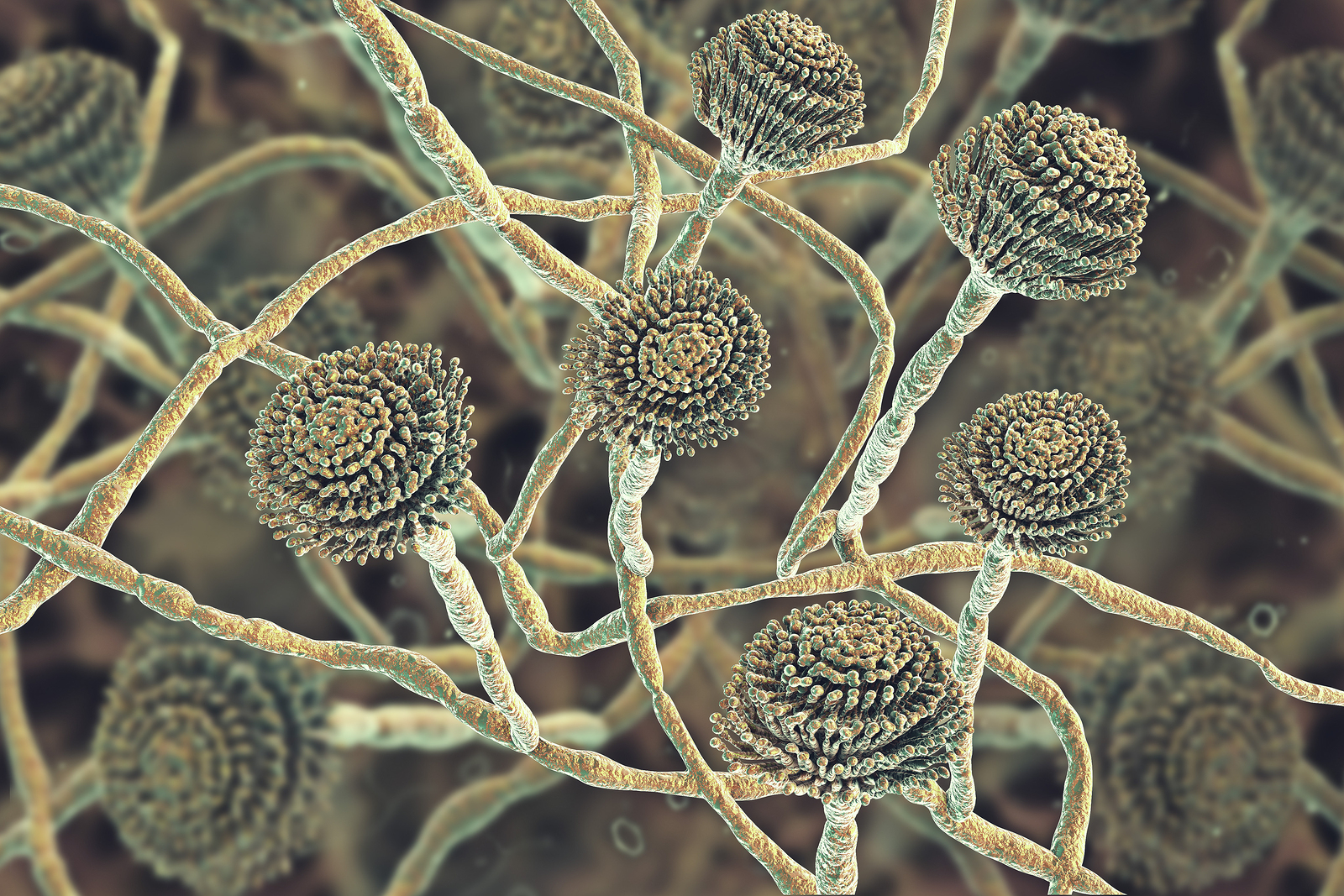There’s nothing more frustrating than feeling lousy for weeks, months, or even years with no clear explanation of why you’re feeling that way. Chronic disease is difficult to live with, but when you have identified what’s causing it at least you have some potential solutions.
I know how difficult it can be to be afflicted with a “mystery illness.” You may begin to think it’s all in your head. Even worse, your health care practitioner might start to think that way when you KNOW there’s something else going on.
So many women show up in my office upset, frustrated, and close to giving up because they just can’t get any answers from their conventional practitioner. They’re given medications that don’t help at all – or even make the symptoms worse!
When I hear these women tell me about their symptoms – chronic respiratory infections, headaches, fatigue, and so much more, I always consider exposure to mold. Mold exposure is almost impossible to avoid, and for some people this can be a huge problem. Let’s take a look at what mold toxicity means, what it can do to your health, and what you can do to heal if mold is behind your chronic health issues.
What is Mold Toxicity?
Mold is everywhere – outdoors and in, so avoiding exposure entirely is neither likely nor necessary. For the majority of healthy people, mold is not a huge issue. But some people are allergic to mold, which can cause a range of typical allergic reactions including hives and skin issues, itchy eyes, and respiratory problems. Others may not have a full blown allergy, but are very sensitive to mold and notice symptoms when exposed. But mold toxicity is a more serious concern that can often be missed by health care professionals.
Some mold spores produce mycotoxins and when these are inhaled or consumed on contaminated foods, they can build up in your body, and cause a multitude of symptoms that just won’t go away. These molds can grow anywhere that has moisture, oxygen and organic materials – so they’re often lurking in areas of your home that you might never suspect! Just because you don’t see mold in your shower doesn’t mean you don’t have a mold issue.
These mycotoxins are both microscopic and fat soluble, and they often end up in your cells and mitochondria, disrupting your health long after the mold itself has been discovered and dealt with. You can heal yourself, but first you need to know what’s making you feel so poorly!
Who is at Risk for Mold Toxicity?
Anyone with a sensitivity to mycotoxins – up to 25% of the population according to some sources – could develop serious illness if exposed for too long. A genetic predisposition that can inhibit the clearance of biotoxins is most often behind this susceptibility. That’s why mold can be present in a home and the whole family doesn’t get ill — they all have a different genetic makeup, and some may have the genes that make mold exposure more toxic while others do not. Women and children can be more likely to have serious reactions to mold toxicity.
Mold can grow throughout the home, particularly in damp, moist spaces like the bathroom or the basement, or any water damaged building. And since 50% of homes and 60% of commercial spaces have encountered some type of water issue, the problem of mold is widespread! That means exposure is much more common than you might think, and the resulting mold toxicity often goes undiagnosed.
It’s also important to mention that your total toxic load plays an important role in how well your body can detoxify. Evaluating your overall health is an important part of the process, and without doing so, it will be difficult to truly feel your best. Stress and trauma, underlying infections, heavy metal toxicity, and hormonal imbalances are all issues that could have an impact how well you heal.
What Are the Symptoms of Mold Toxicity?
Since so many people have mold growing in the spaces they occupy without even knowing it, it’s important to know what kind of symptoms can result from exposure. Symptoms will vary widely, depending on a number of factors including whether you have a mold allergy, and how long you’ve been exposed to the mold.
Common symptoms include headaches, eye irritation, sneezing, throat and nose irritation, a chronic cough, asthma,unexplained skin rashes and other respiratory issues. These symptoms are typical of allergic reactions to anything, and probably make sense when you think about them.
Other symptoms may surprise you. For instance, mold toxicity has been found to be linked to a number of psychiatric symptoms, such as depression, anxiety, concentration, memory loss, and attention issues. Mold can also be behind a fever; chronic fatigue; flu-like symptoms; neurodegenerative diseases like Alzheimer’s and Parkinson’s; digestive issues including Crohn’s disease and ulcerative colitis; autoimmune disorders; hormonal imbalances; severe disruption of sleep; and even cancer! That’s a lot of reasons to pay attention to mold – and it’s not even a complete list!
One of the reasons it’s so hard for health care professionals to diagnose mold toxicity is that so many of these symptoms have numerous other causes. So a lot of time is spent testing and trying different treatment protocols to determine if something else is causing the problems.
How Do I Determine if Mold is the Problem?
If you’ve been struggling with major health issues without any answers after multiple visits to your doctor it’s time to explore the possibility that mold could be the culprit. A thorough examination of your home, especially any damp areas or areas that have seen water damage is advisable.
Toxic black mold is the type you hear most about in the media because of the severe symptoms that can result. But all types of mold can cause health issues, and any amount of mold should be removed as quickly as possible. The Centers for Disease Control and Prevention doesn’t recommend mold testing to determine type, because they say all types of mold should be addressed the same way.
If you discover a small area of mold growth, you might be able to remove it yourself. Instead of using bleach, try a natural product that can clean up the issue without adding more toxins into your air. I think it always makes sense to try a more gentle method like baking soda, vinegar, tea tree or pine oil, hydrogen peroxide or grapefruit seed extract – all powerful cleaning agents – before using something that could be just as damaging to your health as the mold. For a more serious mold issue, you might need professional help to remove it.
If you don’t uncover mold in your house, that doesn’t necessarily mean you are free and clear. Remember, you could be exposed in so many other places – school, work, church, or any other place you visit regularly. Even your car could have a hidden mold problem!
There are a number of tests available to help your health care practitioner determine whether mold is an issue for you, including blood tests, urine tests, nasal sinus cultures, saliva tests, and stool testing. Genetic testing can reveal whether you hold the gene that makes you more susceptible to reactions to mold. If you can, I suggest a full range of testing to give you the full story on your health.
Environmental testing can also be extremely helpful. You can purchase kits to do some types of testing yourself, but if you find significant mold in your home or work area, contacting a qualified professional is highly recommended.
How Can I Heal from Mold Toxicity?
If you and your health care practitioner determine that you’re suffering from mold toxicity, the first thing to remember is that healing won’t happen overnight. It can be a long and difficult process, but I promise you it will be worth it when you finally rid yourself of symptoms that may have been plaguing you for years. Set realistic expectations for your healing, and stick with it!
Testing and recovery can be expensive and frustrating, but there are some simple and cost-effective things you can try to get yourself started. Let’s take a quick look at some things you can do now to start feeling better. These tips can boost your health even if mold isn’t the issue, so there’s no risk and nothing to lose!
Don’t Discount the Mind-Body-Spirit Connection
Health is about more than physical symptoms. To live a truly healthy and full life, it’s crucial to be in touch with your emotions and find things that bring you joy. Daily mindful practices like meditation can make you keenly aware of what is going well – and what needs to change – in your life. Pursuing creative activities and finding a community of like minded people for support and connection are other great ways to nurture your spirit – and your health.
Limit Exposure to Toxins
Paying attention to your toxic load can have a huge impact on how you feel. Avoid exposure to potential toxins by eating organic food whenever possible, avoiding sugar, alcohol, and processed foods, not eating products that contain gluten or corn, choosing non-toxic personal care and cleaning products, and avoiding fragrances other than pure essential oils.
Heal Your Gut and Any Hormonal Imbalances
When your digestive system and/or hormones aren’t functioning properly, healing is much more difficult. Food is the best medicine we have, but there are many other ways to support both digestive and hormonal health that are worth a try! My health library has many more articles to help you discover how to best support these areas.
Eat to Treat Mold Toxicity
Along with a healthy overall diet, consuming foods known to help rid your body of mold is an easy early step to healing. Raw garlic has incredible antifungal power, and can clean your respiratory tracts while stimulating your immune system. Dark green leafy vegetables contain plenty of chlorophyll, which has been shown to protect DNA from damage that toxic mold can cause. Ginger is also an antifungal and antibacterial spice, which can help relieve congestion and aid digestion.
Support Your Body with Supplements as Necessary
Your health care practitioner can help you identify exactly which supplements you need. Because getting the nutrients you need from food alone is so difficult these days, I always suggest women take a daily multivitamin, but you may need more targeted support along your healing journey.
Don’t Let Mystery Symptoms Rule Your Life – Ask Your doctor About Mold Toxicity!
You know your body best, and if it’s telling you something is wrong, you have to listen – even if multiple doctor’s appointments don’t find anything specific. When you’ve explored several options to no avail, it might be time to check out your environment and mold exposure. The places you live, work, and play should be safe havens, not hazardous to your health! For those of you more interested in his topic see my upcoming emails for the toxic mold summit coming soon!
Resources:
https://www.cdc.gov/mold/stachy.htm
https://draxe.com/toxic-mold-causes-depression/
https://www.niehs.nih.gov/health/topics/agents/mold/index.cfm
https://appwell.net/got-mold-now-what-hope-for-health-and-home/2018/12/26/cirs/rjodo/







